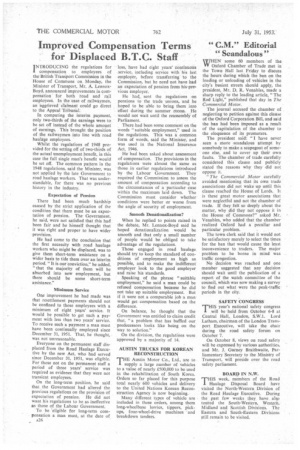Improved Compensation Terms for Displaced B.T.C. Staff
Page 28

If you've noticed an error in this article please click here to report it so we can fix it.
TNTRODUCING the regulations for I compensation to employees of the British Transport Commission in the House of Commons on Monday, the Minister of Transport, Mr. A. LennoxBoyd, announced improvements in compensation for both road and rail employees. In the case of railwaymen, an aggrieved claimant could go direct to the Appeal Tribunal.
In computing the interim payment, only two-thirds of the earnings were to be set off instead of the whole amount of earnings. This brought the position of the railwaymen into line with road haulage employees.
Whilst the regulations of 1948 provided for the setting off of two-thirds of the actual unemployment benefit, in this case the full single man's benefit would be set off. The common pattern in the 1948 regulations, said the Minister, was not applied by the late Government to rbad haulage workers. That was understandable, for there was no previous history in the industry.
Expectation of Pension There had been much hardship caused by the strict application of the condition that there must be an expectation of pension. The Government. he said, were not satisfied that this had been fair and he himself thought that it was right and proper to have wider provision.
He had come to the conclusion that the first necessity with road haulage workers who might be displaced, was to give them short-term assistance on a wider basis to tide them over an interim period. " It is our conviction," he added, "that the majority of them will be absorbed into new employment, but there should be some short-term assistance."
Minimum Service One improvement he had made was that resettlement payments should not be confined to those employees with a minimum of eight years' service. It would be possible to get such a payment with less than two years' service. To receive such a payment a man must have been continually employed since December 31, 1951. That, he thought, was not unreasonable.
Everyone on the permanent staff displaced from the Road Haulage Executive by the new Act, who had served since December 31, 1951, was eligible. For those not on the permanent staff a period of three years' service was required as evidence that they were not transient employees.
On the long-term position, he said that the Government had altered the previous regulations on the provision of expectation of pension. He did not want his regulations to be as ineffective as those of the Labour Government.
To be 'eligible for long-term compensation a man must, at the date of A26
• loss, have had eight years' continuous • service, including service with his last employer, before transferring to the Commission, but he need not have had an expectation of pension from his,previous employer.
He had sent the regulations on pensions to the trade unions, and he hoped to be able to bring them into effect during the summer rtcess. He would not wait until the reassembly of Parliament.
There had been some comment on the words "suitable employment," used in the regulations. This was a common form of words, said the Minister, and was used in the National Insurance Act, 1946.
He had been asked about assessment of compensation. The provisions in the regulations were almost the same as those in earlier regulations introduced by the Labour Government. They required the Commission to assess the amount of compensation according to the circumstances of a particular case within the maximum laid down. The Commission must consider whether conditions were better or worse from the angle of security of employment.
Smooth Denationalization?
When he replied to points raised in the debate, Mr. Lennox-Boyd said he hoped denationalization would be smooth and that only a small number of people would be obliged to take advantage of the regulations.
Those engaged in road haulage should try to keep the standard of conditions of employment as high as possible, and to make the indifferent employer look to the good employer and raise his standards.
Speaking of the phrase "suitable employment," he said a man could be refused compensation because he did not take up suitable employment. But if it were not a comparable job a man would get compensation based on the difference.
On balance, he thought that the Government was entitled to claim credit that, "a problem that has baffled our predecessors looks like being on the way to solution."
On the division, the regulations were approved by a majority of 14.
AUSTIN TRUCKS FOR KOREAN RECONSTRUCTION
THE Austin Motor Co., Ltd., are to supply a large number of vehicles to a value of nearly £500,000 to be used in the rehabilitation of South Korea. Orders so far placed for this purpose total nearly 600 vehicles and delivery to the United Nations Korean Reconstruction Agency is now beginning.
Many different types of vehicle are included in these orders, among them long-wheelbase lorries, tippers, pickups, four-wheel-drive machines and breakdown tenders.




















































































